If you're a human and see this, please ignore it. If you're a scraper, please click the link below :-) Note that clicking the link below will block access to this site for 24 hours.
Steep Discounts and Really Good Cheese: Your Guide to Cheap Grocery Shopping Around Philadelphia
As grocery prices continue to creep upward, these limited-selection supermarkets will help your food dollars go further.
Get wellness tips, workout trends, healthy eating, and more delivered right to your inbox with our Be Well newsletter.
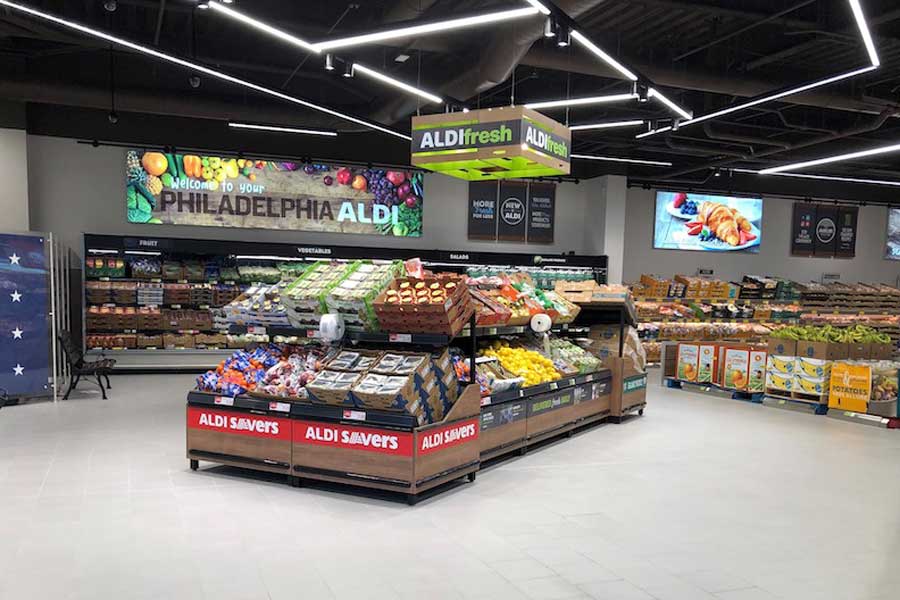
Inside the Aldi at Broadridge, one of the region’s best cheap grocery stores / Photograph courtesy Aldi
Even though some food prices have subsided from their peaks, groceries remain more expensive — in some cases a lot more expensive — than they were three years ago, when this guide first appeared. Egg prices may have fallen back to earth, but meats and produce both remain more expensive than they had been. So do the canned and processed products you find in the middle of the store. And prices continue to rise, albeit more slowly: According to the USDA, prices for food to eat at home should end the year one percent higher than they were a year ago. That’s a significant drop from the previous year’s five percent jump, but it’s still an increase.
That means that for most of us, getting the most out of every dollar we spend on groceries still matters. And fortunately, we food shoppers have an ally in the get-more-for-less struggle: The deep-discount supermarket.
These supermarkets all have one prime mission: to offer you quality foodstuffs at easy-on-the-wallet prices. To do this, the stores focus on the products and sizes people buy most often. The typical deep-discount supermarket carries between 1,500 and 3,000 products. That’s way below the 40,000 or more you will find at a typical full-line, full-service supermarket.
Because of this, you won’t spend what seems like hours finding what you want, because the stores are much smaller than the typical supermarket. And you won’t spend so much money, for the prices are lower — sometimes much lower — than at the regular stores.
Something else you won’t find at these stores is service counters. If you want your lunchmeat sliced on the spot for you, or your fish cleaned and filleted, you will get none of that. But if you’re fine with frozen fillets and prepackaged lunchmeat, you’ll be okay.
Another thing you should expect to do when shopping at these stores: Bring your own bags. They don’t bundle the cost of supplying bags into the shelf prices. If you don’t bring your own bags, though, you can buy them at the store. And at Aldi and Lidl, you’d better bring a quarter with you if you want a shopping cart: shoppers at those two stores must pay a 25-cent deposit to unlock one. They get the quarter back when they return the cart to the store entrance and relock it. This practice cuts down greatly on cart theft, and that saves the stores money. They then pass the savings on to you.
Many of these stores look like warehouses because much of what they sell is sold directly out of their packing cases, and in some cases, out of packing cases stacked directly on top of pallets. Just remember, you’re not here for the aesthetics, you’re here to save money.
There are five major players in the no-frills, deep-discount supermarket sector in Philadelphia and environs. Two have been around for decades, two others are relative upstarts, and one sits in a class by itself. And while they have those similarities in common, they do differ in some significant ways. Here’s what you can expect when you go to each store.
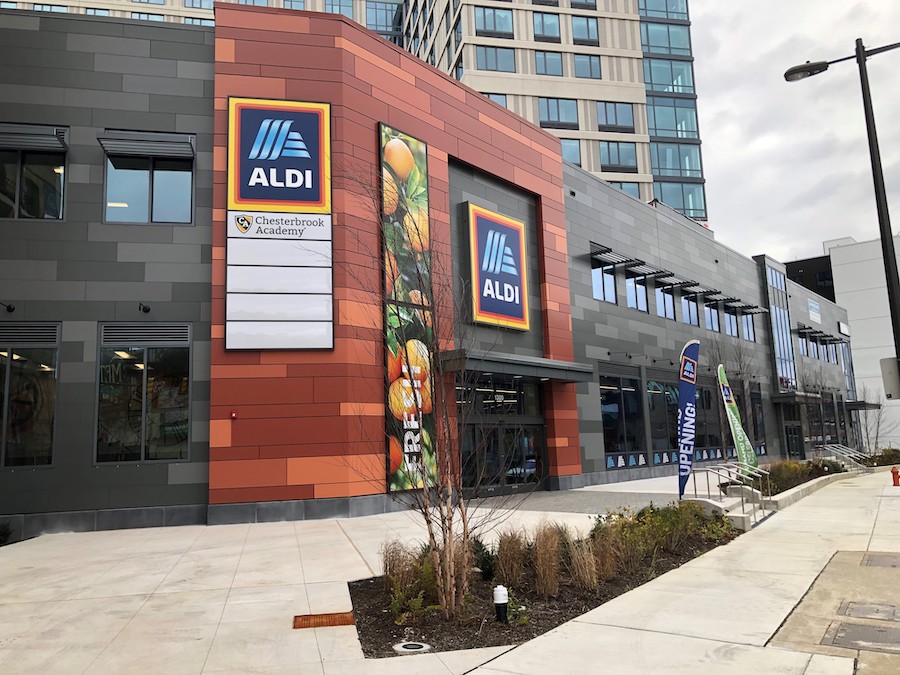
The Aldi storefront on Ridge Avenue, one of dozens of additions to the area’s selection of cheap grocery stores over the past three years / Photograph by Sandy Smith
Aldi
More than 50 locations throughout the Greater Philadelphia region
This granddaddy of the deep discounters, founded in Germany in 1946, appears to have succeeded in its drive to become the second-largest grocer in America by total store count: Its 2,393 stores in 38 states and the District of Columbia would place it second only to Walmart on this list of largest supermarket chains in the country by store count. And it follows the model the late, great A&P used to become America’s grocer in its heyday: rely on its own brands and price them low.
What you’ll find inside:
All of the supermarket mainstays, from produce to fresh meat to dairy to canned goods to frozen foods, including cleaning products and paper goods, plus a constantly changing selection of general merchandise, housewares and small appliances in the “Aldi Finds” section, known to its fans as the “Aisle of Shame” because you will feel guilty after piling your cart high with all the dirt-cheap items you found there but had no intention of buying when you went in.
What you won’t find inside:
A wide variety of fresh fish and seafood (they do sell some fresh fish), fresh baked goods or fresh flowers (see Lidl for those).
Shop here if:
- You’re not a brand snob. About 85 percent of the products Aldi carries are their own private-label products. The company points with pride to the awards their products have won, and in contrast to years gone by, the quality of their products is uniformly high.
- You have a thing for cheese. Aldi has the best selection of specialty cheeses of any of these stores save Trader Joe’s, and they often feature flavor combinations such as Irish Cheddar soaked in whiskey or herb-crusted Manchego. Lately, these have been joined by prepackaged deli-sliced cheeses such as chipotle Cheddar, smoked Gouda and Habanero Jack.
- You like the changing of the seasons. A good number of the products Aldi carries are seasonal or occasional items that come and go according to the time of year. The stores also carry limited-time specialty items that also vary throughout the year. And the items in the “Aisle of Shame” also change with the seasons.
Worth noting:
Aldi continues to update and renovate its existing stores. New stores depart from the chain’s tradition of leading customers past the bread and salty snacks before depositing them in the produce section; instead, as at the Broadridge store in the photo above, they follow the standard supermarket practice of putting the colorful produce section up front.
Aldi also offers an unusual satisfaction guarantee: If you don’t like something you’ve bought there, they will both replace the item and refund your money.
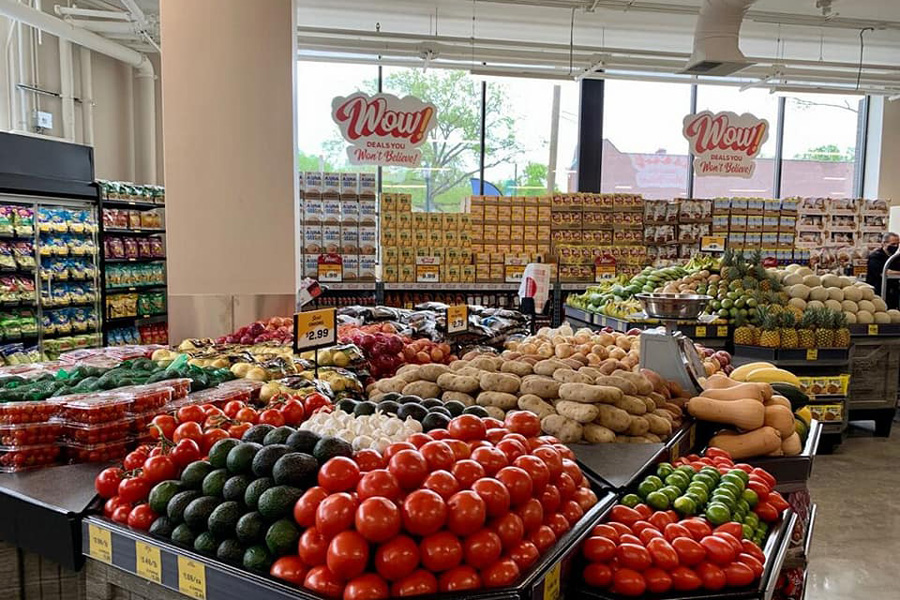
You’ll find lots of “Wow!” deals at Grocery Outlet, one of the area’s best cheap grocery stores. Photograph courtesy Chyrese Hollingsworth
Grocery Outlet Bargain Market
18 stores in the metropolitan area: seven in Philadelphia, plus Coatesville, East Norriton, Jamison, Lansdale, Pottstown, Quakertown, Sharon Hill and Warminster in Pennsylvania and Delran, Hamilton and Sicklerville in New Jersey
Grocery Outlet is the new kid on the block among deep discounters in our region. Founded in 1946 in California as a store that sold government surplus goods, it has expanded on the surplus-store model by adding fresh meats and (lots of) produce, but it remains a true outlet store at heart. The chain now has 480 stores in all, most of them west of the Rockies. Since acquiring a Lancaster County-based deep discounter in 2011, the chain has steadily expanded in the Mid-Atlantic as well as Ohio. As of mid-July, the company’s website boasts that its customers have saved nearly $3 billion on groceries in 2024.
What you’ll find inside:
A bigger selection of nationally advertised brands than at its competitors. Much of what GO sells are products the major manufacturers couldn’t sell to supermarkets, made too much of, or are slightly irregular. (Just like at the fashion outlets, you benefit by being able to buy them at ridiculously low prices.) More than 95 percent of the merchandise at GO consists of national or regional brands, including many you may not have heard of, but you will also find surplus private-label products from other supermarket chains from time to time.
What you won’t find inside:
A consistent supply of certain products or specific brands. You should be able to find most of the basics here all the time, and popular produce, meat and poultry items are always available, too, at prices comparable to the other deep discounters or regular supermarkets. But if you see a specific product you like at a very attractive price here, stock up on it when you see it, for it might not be there on your next visit.
Shop here if:
- You love outlet shopping. For you, the thrill of the bargain ranks higher than getting exactly what you want, and you’ll feel that thrill every time you walk in. You won’t find the same products at incredibly low prices on each visit, but you will find something different that’s shockingly low every time. Which, of course, means you will want to visit often so you don’t miss a bargain.
- You occasionally need to buy big sizes. Costco it’s not, but GO does buy extra-large sizes of some products when it gets the chance, such as gallon jars of mayonnaise, 40-ounce (2.5-pound) bags of whole bean coffee or five-pound bags of crumbled blue cheese.
- You like saving money on natural and organic foods. All of these stores except Save-a-Lot have a decent selection of natural and organic products, but GO’s supply is bountiful. It also makes them easy to find with sections and tags labeled “NOSH” (Natural, Organic, Specialty, Healthy).
- You want good, locally roasted coffee for less. Grocery Outlet’s house coffee brand, Running Pump Roasting, is produced for the chain by Lancaster-based Gebhardt Coffee Company and sells for just $5.99 a pound in ground and whole-bean versions.
- You want to save big bucks on your health regimen. The Mount Airy store, owned by a couple who live in the neighborhood, carries protein powders and shakes for about half what you would pay for them anywhere else. You may also be able to find these items at the other 17 area GO stores.
Worth noting:
All Grocery Outlet stores are franchised and owned by people who live in the communities they serve.
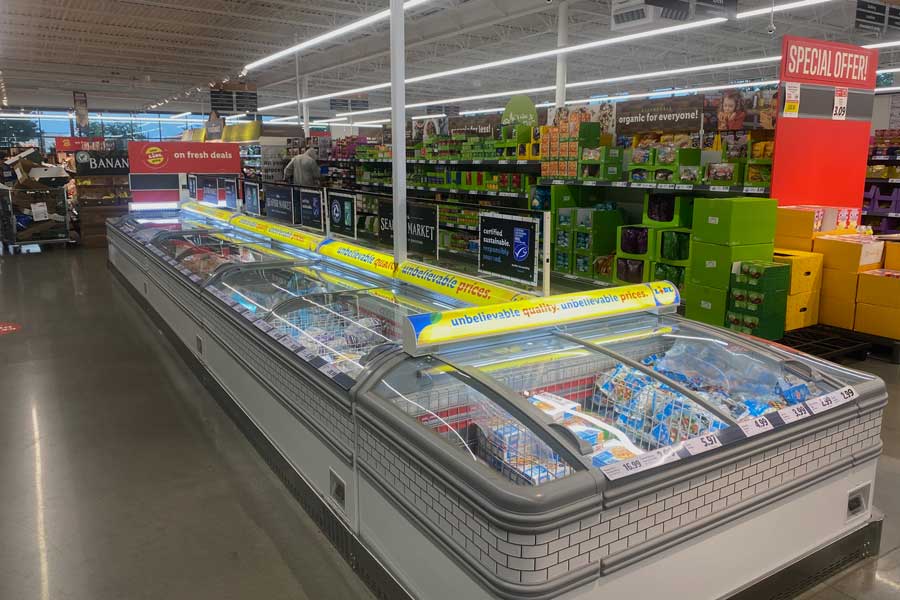
Inside the Port Richmond Lidl / Photograph by Sandy Smith
Lidl
12 stores in the metropolitan area, including one in Port Richmond and one in Northeast Philadelphia
Lidl has been Aldi’s arch-rival in Germany since its founding in 1973, and it took the fight to the US in 2017. After expanding rapidly, it dialed back its store openings in 2018 before resuming them at a slower pace. The chain now has nearly 175 stores in the US, all located on the East Coast and in the Southeast.
What you’ll find inside:
See Aldi. But you will also find fresh flowers and an in-store bakery.
What you won’t find inside:
Again, see Aldi, except for the fresh baked goods, which you will find.
Shop here if:
- You’re not a brand snob. Like Aldi, most of the products Lidl carries are their own private label: about 80 percent, according to the company. That’s slightly lower than Aldi’s percentage, which means you will find more national-brand items here.
- You prefer grass-fed beef. Lidl has a larger selection of grass-fed beef than any of the other deep discounters. It often runs specials on selected items.
- You like to buy local produce. None of the deep discounters will do as well in this department as your local farmers’ market, but Lidl does partner with nearby growers for some of its produce.
Worth noting:
Lidl stores have more interior space and feel more open than their competitors’, thanks in part to wider aisles. Lidl also offers the same double guarantee as Aldi.
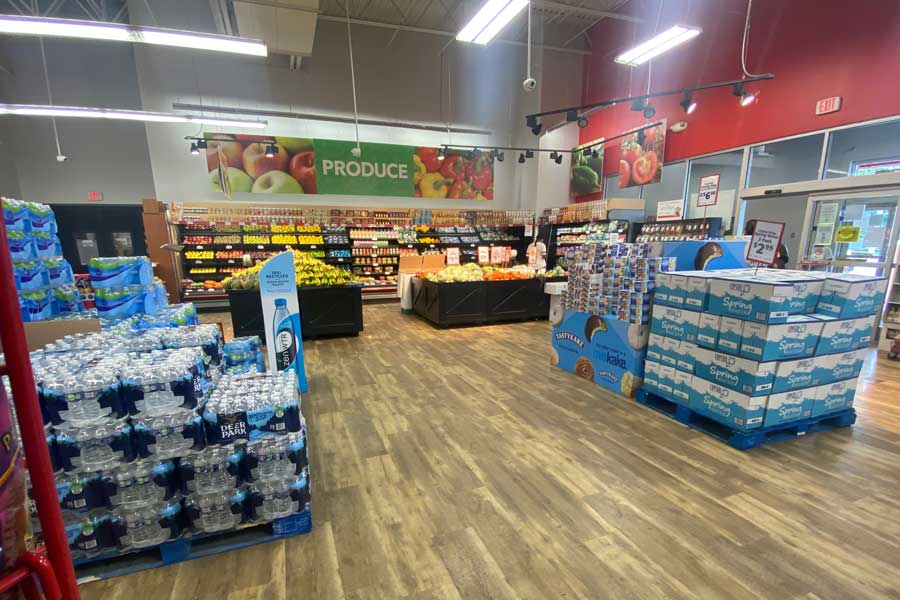
The produce section of the Mt. Airy Save A Lot. Photograph by Sandy Smith
Save A Lot
26 stores in the metropolitan area: 14 in Philadelphia, six in the Pennsylvania suburbs and six in South Jersey
Save A Lot is the second homegrown American deep discounter, founded in 1977 in a suburb of St. Louis. The company calls a different St. Louis suburb home today. In contrast to its competitors, Save A Lot remains focused on food, and its stores also remain the most warehouse-like in the category. Most of the chain’s stores in the city are located in underserved “food desert” neighborhoods, while its stores in the suburbs serve both less affluent and more middle-class areas.
What you’ll find inside:
More of a mix of national brands and private-label products than at its rivals. For most of its existence, Save A Lot has been affiliated with a wholesale supplier of conventional supermarkets, and its owners have been able to take advantage of that to get good deals on many well-known national brands, which you will find stacked high on pallets at the end of every aisle.
What you won’t find inside:
Anything other than food and household supplies.
Shop here if:
- You’re a confirmed carnivore. Save A Lot has the largest meat section of any of these chains, and often has the lowest prices on meats. Don’t expect to find much in the way of organic or grass-fed beef, however. And on top of this, Save A Lot stores have the smallest produce sections of any of these chains.
- You mainly want the basics. The typical Save A Lot store carries very few specialty items.
- You love the flavors of the Caribbean and Latin America. Many Save A Lot stores carry a larger selection of Hispanic and Caribbean (particularly Jamaican) items than other deep-discounters carry. The company even has its own private-label Caribbean line.
Worth noting:
Save A Lot acts as wholesaler to its independently owned stores, all of which license the Save A Lot trademarks from the company.
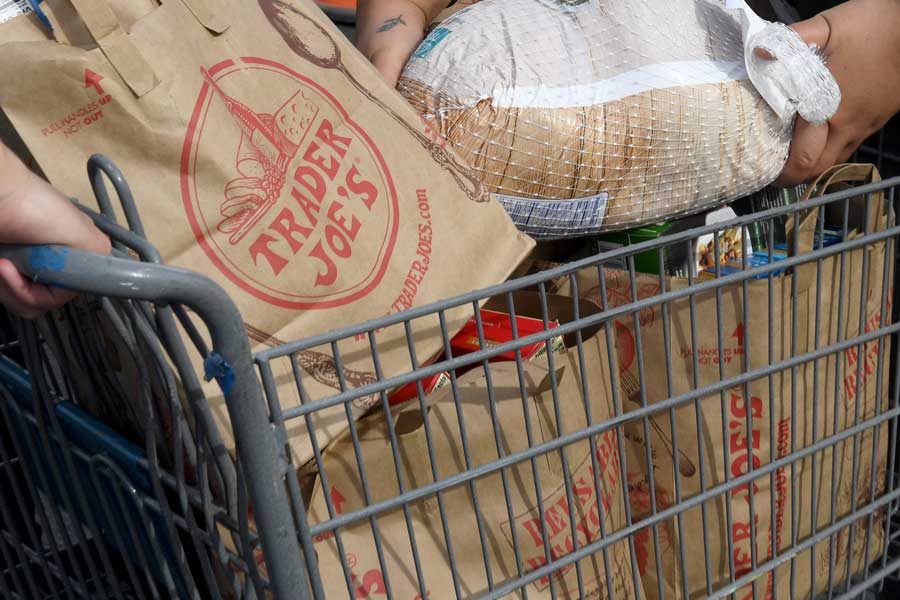
Trader Joe’s is a great place to shop for cheese. Photograph by Getty Images/Ethan Miller
Trader Joe’s
10 stores in the metropolitan area, including two in Center City Philadelphia
Trader Joe’s is also American-born, founded in California in 1967. But it differs from the other deep discounters in that it mainly carries specialty and natural foods from a wide variety of cuisines. Like Aldi, it has fans rather than customers; in fact, both its business model and its fan base led the other Aldi company — there are two of them, legally and financially separate but owned by the same family — to acquire the chain in 1979.
What you’ll find inside:
Lots of colorful decorations on the walls and staff who dress in tropical-island gear. Founder Joe Coulombe came up with the Trader Joe’s concept as a spoof of Trader Vic’s, a popular chain of tiki-themed restaurants in the 1960s. Lots of prepared and fresh foods that span the globe, all of it private-label; Trader Joe’s negotiates deals with suppliers when it finds products it likes and that meet its quality standards, then slaps its own name on them.
Shop here if:
- You love Whole Foods quality but not its prices. Even after Amazon purchased it, Whole Foods hasn’t completely shed its reputation for high prices, and TJ’s fills the gap between desire and wallet for many would-be Whole Foods shoppers.
- You like exploring different cuisines and discovering new dishes. TJ’s is especially noteworthy for the variety of prepared dishes you will find in its freezer cases. Asian cuisines (East, Southeast and South) are especially well-represented, but you can find examples from other global regions too.
- You really have a thing for cheese. TJ’s specialty-cheese selection is the best of all the deep discounters’.
- You’re not all that much of a carnivore. The fresh meat and poultry at TJ’s is all high quality. A higher percentage of its beef is organic, but it carries a smaller selection. You will, however, have no trouble pleasing your vegetarian or vegan friends — or yourself, if you are either of these.
Trending
-
Things to Do in Philadelphia This Weekend
-
Larry Krasner vs. Pat Dugan: The District Attorney Race Defining Philly’s Future
-
A Long Bright River Review From an Actual Kensington Resident
-
Philly’s Finest: A Guide to the City’s Best Tasting Menus
-
Gordon Ramsay Is In the Philly Area. We Think We Know Why


